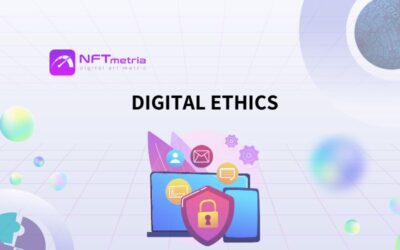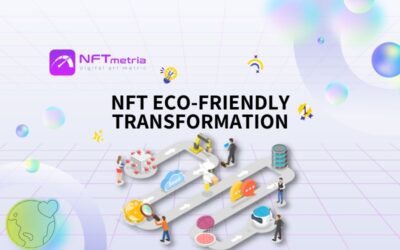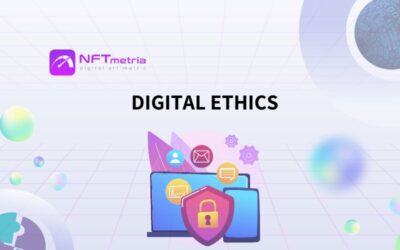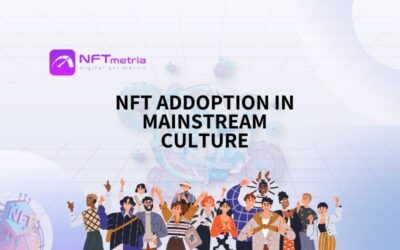In the ever-evolving landscape of the digital age, the rise of Non-Fungible Tokens (NFTs) has ushered in a new era of ownership and expression. As these unique digital assets gain prominence across art, entertainment, and beyond, a critical conversation emerges – the ethics of digital ownership. This article delves into the intricate dimensions of NFT ethics, exploring their impact, challenges, and evolving perspectives.
What is digital ethics and why is it important?
Digital ethics refers to a set of norms, principles, and values that govern the behavior and interactions of individuals in the digital realm. It encompasses issues of data privacy, online security, digital community engagement, responsible technology use, and respect for the rights and feelings of others in the online environment. Digital ethics aims to uphold morality and respect in the digital age, where human interaction with technology is increasingly integrated into daily life.
Ethics in the Digital Realm: Why it Matters
In the vast expanse of the digital realm, ethics serve as the moral compass guiding our interactions, decisions, and creations. As NFTs become a cornerstone of digital ownership, understanding and embracing ethics is crucial. Ethical considerations navigate the complex intersection between technology, culture, and society, ensuring that the benefits of innovation are harmonized with responsible behavior.
In the context of NFTs, ethics provide a framework to address questions of authenticity, originality, and environmental impact. They challenge us to consider the implications of turning digital artifacts into commodified assets, and they underscore the importance of ensuring that artists are fairly compensated for their creations. Just as in the physical world, ethics urge us to protect the rights and dignity of creators, viewers, and participants in the NFT ecosystem.
Furthermore, ethics play a pivotal role in bridging the gap between the digital and physical realms. As NFTs gain traction, the divide between the tangible and the intangible blurs. Ethical considerations guide us in defining the value of digital possessions, determining how we preserve digital heritage, and ensuring equitable access to these virtual assets.
In essence, ethics in the digital world serve as the underpinning of a harmonious and sustainable future. By adhering to ethical principles, we safeguard the potential of NFTs to revolutionize creativity, empower artists, and reshape economies while fostering an environment that respects individual rights, upholds social values, and contributes positively to the world at large. As NFTs continue to captivate our imaginations and transform industries, the importance of ethical discourse becomes paramount, shaping the trajectory of this revolutionary digital frontier.
Key Ethical Issues in the Digital World
The Digital Revolution and Ownership
NFTs represent a seismic shift in the concept of ownership. By utilizing blockchain technology, NFTs grant indisputable proof of ownership and authenticity for digital creations, from digital art pieces to tweets and memes. However, this innovation isn’t without its ethical implications.
Environmental Concerns and Sustainability
One of the most pressing ethical considerations revolves around the environmental impact of NFTs. The energy-intensive nature of blockchain transactions, particularly in Proof of Work systems, has sparked concerns about their carbon footprint. As the NFT market grows, the industry faces the challenge of reconciling innovation with environmental responsibility.
Artistic Integrity and Originality
The NFT space has raised questions about artistic integrity and originality. The ease of reproducing digital content complicates notions of scarcity and uniqueness. Artists must grapple with how to maintain the value of their work while preventing plagiarism and unauthorized duplication.
The Clash of Digital and Real-World Value
Another ethical dilemma lies in the valuation of NFTs. The astronomical sums that NFTs can fetch have triggered debates about the divide between their digital nature and their real-world worth. As collectors pour substantial investments into digital items, questions arise about the sustainability and longevity of these valuations.
Empowerment and Financial Inclusion
Conversely, NFTs have empowered creators by allowing them to directly monetize their work, sidestepping traditional gatekeepers. This shift has the potential to democratize the creative landscape, providing opportunities for underrepresented artists and creators to gain recognition and financial rewards.
NFTs as Cultural Artifacts
NFTs are not solely digital assets; they’re cultural artifacts. From iconic tweets to memorable memes, they represent moments in time that hold cultural significance. The ethics of preserving these artifacts in digital formats and ensuring they remain accessible for future generations are complex and multifaceted.
Balancing Innovation and Responsibility
As the NFT ecosystem matures, a careful balance between innovation and ethical responsibility becomes imperative. Industry stakeholders, from platforms to creators and collectors, must collectively address the ethical considerations arising from NFT adoption. Solutions could include embracing greener blockchain technologies, fostering transparent ownership, and nurturing a culture of respect for creators’ rights.
Non-Fungible Tokens (NFTs) have the potential to address ethical concerns in several ways:
- Provenance and Authenticity: NFTs can establish a verifiable chain of ownership and authenticity for digital assets, reducing the risk of plagiarism and unauthorized use. This ensures that creators receive proper recognition and compensation for their work, promoting ethical content creation.
- Fair Compensation: NFTs enable creators to retain ownership of their digital creations and receive direct compensation through smart contracts. This eliminates intermediaries and ensures that creators are fairly remunerated for their contributions, enhancing ethical earning opportunities.
- Digital Rights Management: NFTs provide a framework for managing digital rights and licenses. Artists can specify how their work can be used, minimizing unauthorized reproduction and distribution, and preserving ethical use of their creations.
- Transparency: Blockchain technology, which underpins NFTs, offers transparency by recording transactions on a public ledger. This transparency can aid in holding platforms and users accountable for ethical behavior, such as respecting copyright and ownership rights.
- Charitable Initiatives: NFTs can be used to support charitable causes. Artists can tokenize their work, with a portion of the proceeds going to charities. This encourages ethical practices by leveraging digital assets for social impact.
- Environmental Considerations: Ethical NFT projects are exploring eco-friendly blockchain solutions, addressing concerns about the carbon footprint of blockchain networks. These initiatives prioritize sustainability and align with ethical environmental values.
- Empowerment of Underrepresented Artists: NFTs offer a platform for artists who may have been marginalized in traditional art markets. This inclusivity aligns with ethical principles of promoting diversity and equal opportunities in creative spaces.
- Educational Initiatives: NFTs can be leveraged for educational purposes, enabling creators to educate audiences about cultural, historical, or scientific content. This fosters ethical knowledge dissemination and cultural preservation.
In essence, NFTs hold the promise of introducing ethical solutions in the digital realm, reshaping the way ownership, compensation, and creative control are managed, and contributing to a more ethically conscious digital ecosystem.
Conclusion: The Ethical Odyssey
The rise of NFTs is not just a technological phenomenon; it’s an ethical odyssey. Balancing the potential for creative empowerment and financial gain with the need for environmental sustainability and integrity challenges the very essence of digital ownership. The discourse surrounding NFT ethics is an integral part of shaping the future of this transformative space. As we traverse this uncharted territory, we must tread carefully, engaging in open dialogue, seeking innovative solutions, and striving to create an NFT ecosystem that reflects our collective ethical aspirations.











